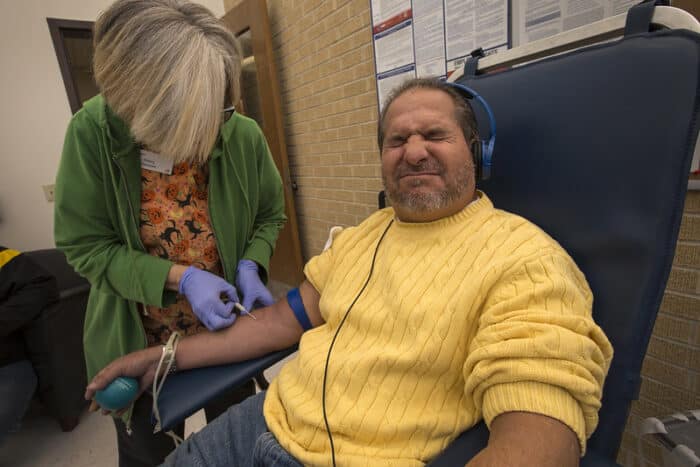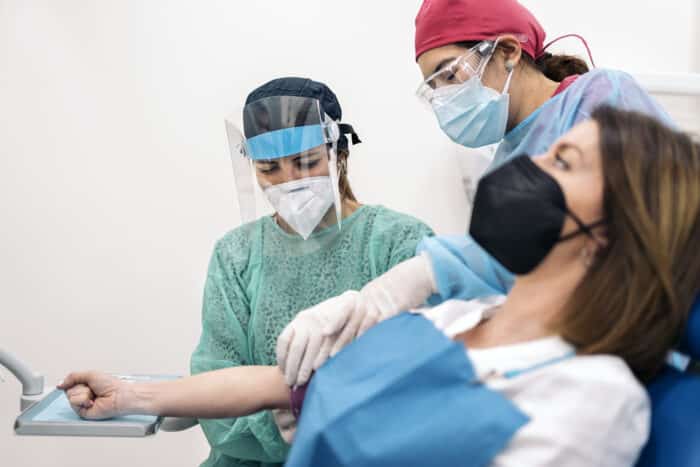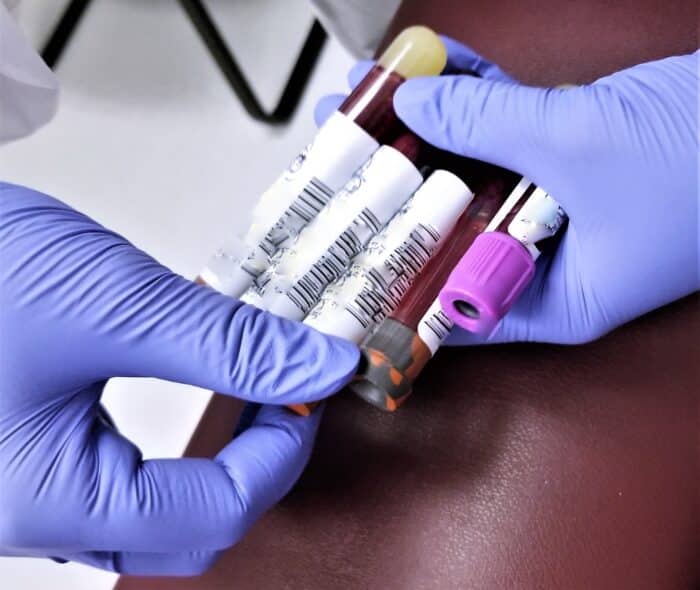Are you fascinated by the procedure of bloodwork, and helping people?
Does caring for people and helping them diagnose their illnesses give you satisfaction? If your answer to most or all of these questions is yes, then phlebotomy might be the best career choice for you.
Phlebotomists can also be called the ‘Masters of Blood Drawing’ since they have their own unique set of skills that set them apart from other healthcare professionals.
If you’re interested in pursuing this rewarding career or are looking to build your skill set to become a successful phlebotomist, this article is for you.
In this article, we will uncover the important skills phlebotomists need to become valuable, how you can develop the right skills, and other FAQs.
So let’s dive right in.
What Do Phlebotomists Do? An Overview
It might be pretty evident that the primary responsibility of a phlebotomist is drawing and collecting blood, usually for diagnosis.
But, phlebotomists also handle additional roles and responsibilities apart from just drawing blood, such as:
- Patient Identification: Phlebotomists are required to verify the patient’s identity to ensure proper sample collection.
- Infection Control: This is one of the most important aspects of a phlebotomist, to maintain a clean and sterile environment so that there is no risk of infection.
- Equipment Maintenance: Phlebotomists are also required to keep their equipment, such as collection tubes, syringes, and needles sterilized and in good working condition.
- Specimen Storage and Handling: After the blood drawing and collection are done, phlebotomists are required to handle and store the specimens appropriately so that they reach the laboratory in good condition.
- Assisting Healthcare Staff: Phlebotomists are also sometimes required to assist other healthcare professionals with procedures.
Also read: What is a Phlebotomist?
Phlebotomist Skills
Phlebotomists are trained healthcare professionals who are skilled in drawing and handling blood for patient diagnosis.
Since they are very important members of the healthcare team with one of the most critical responsibilities, phlebotomists are required to have a unique set of skills.
If you’re interested in becoming a phlebotomist, you must be wondering what skills are required to become one, or which skills you need to add to your resume to shine in front of employers.
We have curated a list of all types of skills, clinical, administrative, and soft skills, which you can refer to and develop to become an invaluable potential employee.
Let’s take a look.
Resume Skills
- Phlebotomy Certification/License- Holding a valid phlebotomy certification or licensure is often a requirement for practicing as a phlebotomist.
- Education– Completion of a phlebotomy training program, which includes theoretical knowledge and hands-on clinical experience, is important.
- Venipuncture Technique- Demonstrating expertise in performing venipuncture, capillary punctures, and arterial punctures with precision and patient comfort.
- Medical Terminology- Familiarity with medical terminology to communicate with healthcare professionals and interpret lab requisitions.
- Infection Control- Strictly following infection control guidelines and maintaining a clean and sterile work environment.
- Safety Protocol- Adhering to safety protocols to prevent any injuries or accidents.
- Specimen Handling- Properly labeling, handling, and transporting blood specimens to ensure accurate testing and results.
- Equipment Proficiency- Being skilled in using various phlebotomy equipment, including needles and blood collection tubes.
- Quality Assurance- Ensuring accuracy and precision in blood collection and maintaining quality assurance standards.
Clinical Skills
- Venous Access- Identifying suitable veins for blood draws and dealing with difficult or fragile veins effectively.
- Patient Care- Providing compassionate care, addressing patient concerns, and ensuring a comfortable experience during the blood collection procedure.
- Hematology- Understanding the different blood components and their significance for diagnostic purposes.
- Phlebotomy Techniques- Familiarity with different phlebotomy techniques for specialized cases, such as pediatric or geriatric patients.
- Specimen Processing- Knowledge of proper handling and processing of blood samples for different laboratory tests.
- Order of Draw- Understanding the correct order of draw to prevent sample contamination and test result inaccuracies.
- Hemoconcentration Techniques- Employing hemoconcentration techniques when collecting capillary blood samples.
- PPE Usage- Using personal protective equipment (PPE) appropriately to protect both patients and oneself during blood collection.
Administrative & Soft Skills
- Communication– Excellent communication skills to explain procedures to patients, answer questions, and interact effectively with the healthcare team.
- Empathy and Patience- Demonstrating empathy, patience, and sensitivity when dealing with patients, especially those who may be anxious or needle-phobic.
- Attention to Detail- Paying close attention to details in record-keeping, labeling, and patient information to ensure accuracy.
- Time Management- Efficiently managing time to adhere to schedules and ensure patients are seen promptly.
- Adaptability– Being flexible and adaptable to changing work environments, protocols, and patient needs.
How to Develop the Right Skills
Now that you know the types of skills that are required and preferred by employers, you might want to know how to develop them.
The right skills can get you in the limelight, make you noticeable in front of employers, and ultimately land you your dream jobs ASAP.
Let us help you with that.
Here is how you can develop the right set of skills employers look for while hiring phlebotomists:
1. Education and Training:
The first step in gaining the right foundation in education is completing your high school diploma or a GED.
After that, you can enroll in a formal phlebotomy training program as the next step. These programs are typically offered by community colleges, vocational schools, or specialized medical institutes.
One important thing to look for is programs that are accredited by relevant healthcare organizations to ensure that you receive high-quality education and training.
During the phlebotomy training program, you will get to learn various aspects of the field. This includes coursework that covers anatomy and physiology, infection control practices, medical terminology, and the techniques and skills necessary for successful venipuncture. These classroom sessions provide you with a theoretical foundation that you will later apply in practical settings.
2. Hands-On Experience:
Getting hands-on experience after training is important for any profession, and in the case of phlebotomists, it’s vital to put your learned knowledge and skills to use in a real-world setting.
Some phlebotomy training programs include a clinical practice component where you get the opportunity to work directly with patients under the supervision of experienced professionals.
During clinical practice, you will learn how to interact with patients in a medical setting, perform venipuncture procedures, handle specimens, and maintain infection control protocols. This practical exposure helps you develop the accuracy and confidence needed to perform phlebotomy procedures effectively and safely.
Additionally, seeking internships or externships in healthcare settings provides you with additional real-world experience. These opportunities allow you to work in a professional environment, understand the workflow of a healthcare facility, and collaborate with other healthcare professionals. It’s during these experiences that you’ll refine your techniques, adapt to different patient situations, and gain insight into the practical challenges of the job.
Also see: How to Become a Phlebotomist

Do You Want To Become a Phlebotomist? Check Out Free Phlebotomist Masterclass!
In our masterclass you learn:
- How to be a Phlebotomist faster…in just 2 months!
- Avoid student debt & driving to classes
- #1 thing employers want from Phlebotomists
- How to stand-apart & get a university certificate for a strong resume
Phlebotomist Salary and Job Outlook
Phlebotomists have been in high demand recently, since the rise of the baby boomer population.
The job outlook and job growth opportunities for phlebotomists therefore look fairly positive for the next few years.
According to the U.S. Bureau of Labor Statistics (BLS), the national mean wage for phlebotomists was $37,380, or $17.97 per hour.
It is important to note that these salary figures are highly dependent on influencing factors such as job location, experience, certifications, and so on, and are hence subject to change.
Read more: Phlebotomist Salary
The BLS also reported that the projected job growth for phlebotomists for the next decade is expected to rise by 10%, which is much faster than the average for all other professions.
See: How Long Does it Take to Become a Phlebotomist
What are the Top Two Skills That Employers Look For in Phlebotomists?
This is a common question many aspiring phlebotomists are curious about.
Even though employers look for a variety of skills when hiring phlebotomists, here are the two skills you must have to stand out from the crowd:
Phlebotomy Techniques:
This is one of the most important skills a phlebotomist needs to develop, as it is also one of the primary responsibilities of a phlebotomist. Employers highly value candidates who possess strong technical skills in venipuncture and blood collection procedures.
This includes the ability to locate veins accurately, select appropriate needles and equipment, perform a successful venipuncture with minimal discomfort to the patient, and properly handle and label blood samples.
Good Interpersonal and Communication Skills:
Another important skill to have as a phlebotomist is excellent communication skills. Effective communication is essential in phlebotomy, as they regularly interact with patients, healthcare professionals, and laboratory staff.
Employers generally look for candidates who can put patients at ease, explain procedures clearly, and address any concerns or questions patients may have. Strong interpersonal skills also enable phlebotomists to build rapport with patients.
Conclusion
Being a phlebotomist involves more than just drawing blood; it demands strong communication, empathy, attention to detail, and a commitment to patient well-being. Phlebotomists bridge the gap between patients and lab experts, playing a crucial role in healthcare.
By mastering these skills and staying updated with the latest techniques, phlebotomists can excel in their field and provide excellent care. Whether you’re in healthcare or considering a career in phlebotomy, recognizing and valuing these skills is essential for patient care and the success of the healthcare system.
Related Resources:
- Phlebotomy Certification
- Phlebotomy Requirements
- Day in the Life of a Phlebotomist
- Ultimate Phlebotomist Resume Guide – Phlebotomy Job
- Phlebotomist Job Description
- Can A Phlebotomist Start IVs?
- Phlebotomist Duties
- What is the Difference Between a Licensed Phlebotomist and Certified Phlebotomist?
- Where Can a Phlebotomist Work?
- Pros and Cons of Being a Phlebotomist
- Phlebotomy Externship
- Mobile Phlebotomist
- What Jobs Can I Get With a Phlebotomy Certificate?
- How Long is a Phlebotomy Course?
- Phlebotomist Cover Letter
- Phlebotomy Classes Cost
- Therapeutic Phlebotomy
- Phlebotomist Education
- Cardio-Phlebotomy Technician
- Online Phlebotomy Classes
- Phlebotomy Interview Questions
- Phlebotomist Career
- 4-Week Phlebotomy Classes Online
- Venipuncture vs. Phlebotomy: Differences
Related Articles
-
How to Be Successful in College in 2022 – 7 Simple Tips to Succeed
-
How Do Scholarships Work? Read This First…Truth is Shocking
-
7 Best College Majors 2024: What Should I Major In?
-
How to Choose a College – 10 Things You Must Consider in 2024
-
Why Go to College? Top 13 Benefits for Adult Students in 2022
-
Top 5 Best Alternatives to Community College for 2024









